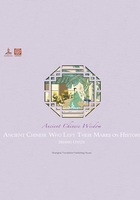
庄子 Zhuāng Zǐ (circa 369-286 BC)
Freewheeling Taoist
Zhuang Zi was a principal Taoist philosopher in the Warring States Period (475-221 BC). His birthplace was only 50 kilometers from the birthplace of Lao Zi, the founder of Taoism. And they were later deemed the two most important representatives of the “Lao Zhuang School” of Taoism.
Zhuang Zi, with a given name of Zhou, served as a minor official in the State of Song for a short period of time. Soon, he quit and began to concentrate on writing books.
Many people believe that Zhuang Zi was the author of the book of the same name, Zhuang Zi (“Zhuang-tzu”).
Unlike the famous 5,000-word Daodejing (“Tao Te Ching”), or the Book of Virtue, written by Lao Zi, Zhuang Zi is a 33-chapter text of more than 100,000 words.
In the book, Zhuang uses multiple and often divergent styles in making his points.
To explain an idea or a concept, he may use parables, dialogues, paradoxes and even jokes to impart his unique philosophical perspectives.
To explain Dao (also known as Way or Great Integrity), which is the essential concept of Taoism, Zhuang Zi points out that Dao is the source of creation, the process of constant change of the world, and the path of human action that can align individuals with this all-embracing cosmic process.
He also stressed that names and labels are all-too-human attempts to categorize the world, which could only end in failure.
He says: “Monkeys pair with monkeys, deer go with deer, and fish play with other fish.
“Men claim that Maoqiang and Lady Li were beautiful, but if fish saw them they would dive to the bottom of the stream, if birds saw them they would fly away, and if deer saw them they would break into a run. So, among these four, which one knows the standard of true beauty in the world?
“The way I see it, the rules of benevolence and righteousness and the paths of right and wrong are hopelessly snarled and jumbled.”
Meanwhile, Zhuang advocates living one’s life as naturally as possible.
He says a man should accept his inclinations and aptitudes as they are, instead of gauging them in response to social pressures and criticism. He best illustrates his perspective in a dialogue with Hui Zi (390-317 BC), a famous statesman and philosopher of his time.

Hui Zi said to Zhuang Zi, “I have a big tree called a shu. Its trunk is too gnarled and bumpy to apply a measuring line to, its branches too bent and twisty to match up to a compass or square. You could stand it by the road and no carpenter would look at it twice ...”
Zhuang Zi said, “Now you have this big tree and you’re distressed because it’s useless.
“Why not plant it in ... [the Dao], relax and do nothing by its side, or lie down for a free and easy sleep under it? Axes will never shorten its life, nothing can ever harm it. If there’s no use for it, how can it come to grief or pain?”
Relying solely on writing books, Zhuang could hardly make ends meet. But when the king of the State of Chu offered him a thousand taels of gold and the position of prime minister, he declined.
Zhuang said that he’d rather “wallow happily in the muddy water like a turtle” than slave away at the behest of a ruler.